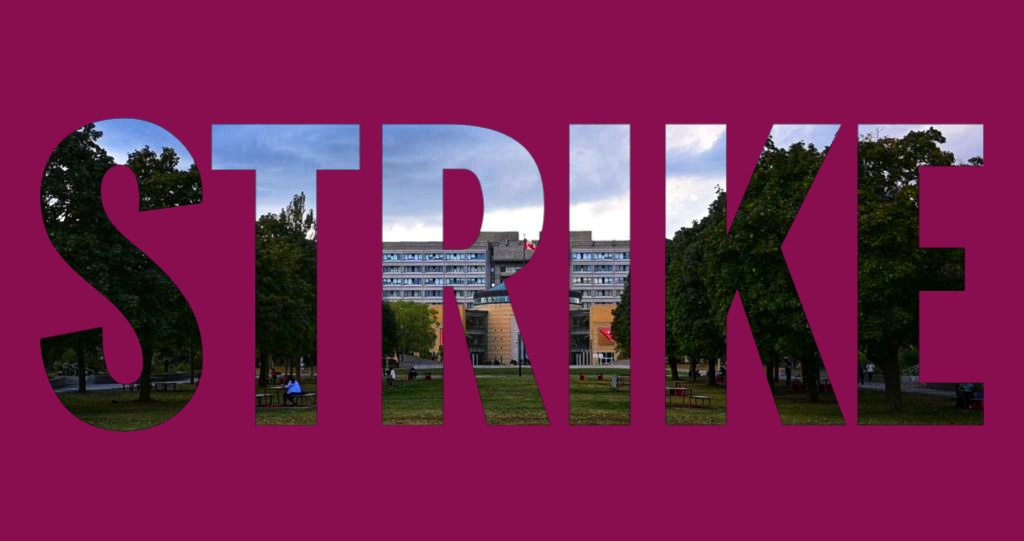After a weekend of bargaining, York employees belonging to CUPE 3903 have voted to go on strike. The decision follows yet another meeting where the university was once again unsuccessful at reaching a “negotiated collective agreement” with the union.
CUPE 3903 represents nearly 3,000 part-time (contract) faculty, graduate assistants, and teaching assistants. On Friday, Feb. 23, union members voted to officially go on strike beginning Feb. 26.
Many students have expressed their support for CUPE employees. One such student is Ollie Levai, a third-year student completing a double major in English and creative writing. Levai shares her thoughts about the university’s latest response:
“I dislike that York’s administration is using language that is implying CUPE’s demands are unreasonable,” she tells Excalibur. “They state students are their priority, yet they refuse to offer their contract professors pay increases and job stability. These are the people who are providing us students [with] our education, and yet York refuses to listen to their needs.”
Aqib Chaudhry, a third-year creative writing student, addresses specific points regarding the university’s recent response: “The distinction that the university seems to have failed to understand is that CUPE 3903 isn’t a separate entity; it represents the teaching staff and faculty that the university has employed to serve the students it claims to care so deeply for the education and wellbeing of.”
Chaudhry also adds that York’s continued failure to recognize the importance that the staff plays in the university’s mandate to education “is one that greatly hurts the trust that many students have towards their institution.”
On Saturday afternoon, emails started flooding in from professors and faculty regarding the potential disruptions to classes and the grading of any coursework. While contract faculty have suspended and cancelled their classes, part-time and full-time faculty are choosing a “play it by ear” approach, where classes will be taught for two to three weeks as usual, in hopes that during this period the university will present the union with a fair deal that will end the strike. However, it is unclear as of now what the situation will be for ongoing classes after the tentatively scheduled three-week grace period.
As of Sunday night, the university has set up a Course Status website where students can receive updated information pertaining to their classes. The Senate Executive Committee made it clear that the “decisions of individual course instructors are not affected by statements or motions on behalf of a program, department, or Faculty Council.” This statement points to great uncertainty and variability in how classes will be conducted and coursework administered. As of Feb. 25, the Senate Executive Committee has issued a university-wide update that, should this labour disruption last longer than six days, contingency plans will take effect and further guidance and instruction will be issued by the university.
“Decisions about course continuity and mode of delivery will be made on a course-by-course basis, based on the academic judgement of individual instructors with oversight by the Dean’s office,” the university states under CUPE 3903’s Collective Bargaining FAQ page. The senate policy also encourages individual instructors to assess “how best to maintain academic integrity and minimize any loss of instructional support to students.”
What can students expect? Based on each individual course status, students have several options available to them. If a course is temporarily suspended due to the strike, it is highly advisable for students to complete their assignments and any outstanding course components in the event that marking and grading will commence again after the labour disruption is over.
On the other hand, students whose courses are active and continuing during the strike can expect their classes to proceed as normal, with a few exceptions. York Senate has a list of policies pertaining to “academic implications of disruptions or cessations of university business.” Of particular importance is Section 2.2: Fairness to Students, which covers and outlines students’ academic rights and responsibilities during this tumultuous time.
Senate policy states that students who “choose not to participate in academic activities owing to a strike or lock-out on campus are entitled to immunity from penalty, to reasonable alternative access to materials covered in their absence, to reasonable extensions of deadlines and to such other remedy as Senate deems necessary and consistent with the principle of academic integrity.”
For students opting not to partake in class activities during this time, it is important to note that senate policy (under Section 2.2.2) makes it clear that any remedies granted on behalf of labour disruptions will not “relieve the student of the responsibility for mastering materials covered.”
Students can find information pertaining to the strike on CUPE 3903’s Strike FAQ page.


